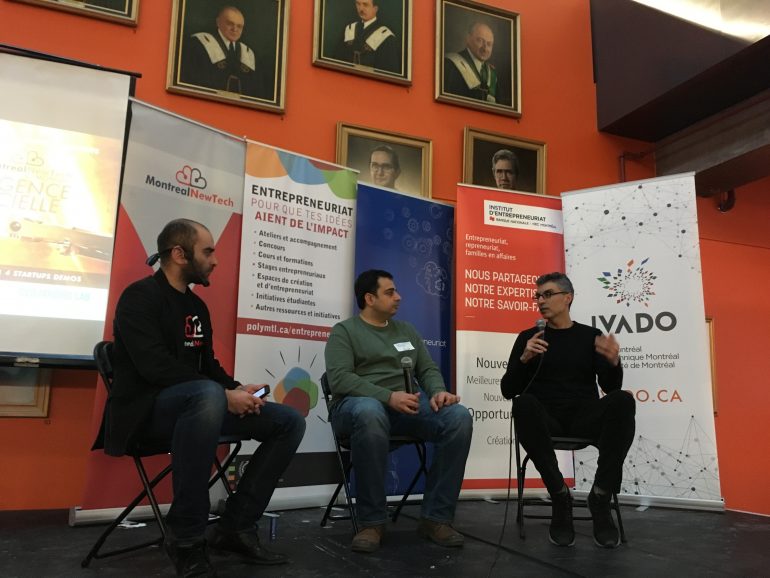Pour lire cet article en français, cliquez ici.
The latest MTL NewTech event was dedicated to artificial intelligence (AI), which has been on everyone’s lips for some time. The non-profit organization, which aims to foster the Montreal ecosystem by giving entrepreneurs the opportunity to present their startup, brought together big players of AI: Yoshua Bengio, co-founder of Element AI, and director of the Institute of Montreal Learning Algorithms (MILA) and member of IVADO; and Shibl Mourad, director of Google Montreal.
When asked about the state of current research in natural language understanding, Bengio took the stand. “I think that what we have is not yet close to satisfying…The good news is that research in this area is moving very fast and it’s one of the most dynamic research areas in deep learning,” he said. “Google Translate actually uses neural nets, using some of the ideas that were developed in Montreal at MILA a couple of years ago.”
The discussion then moved towards the importance of open data in the AI space. “There is actually a lot of effort, and much of it is coming from companies including Google, Microsoft, Facebook, putting out data sets,” says Bengio. “Many of these companies are investing in those data sets for research purposes, knowing that it’s not just for their people, but that it’s good for the community.”
As the world pays more attention to Montreal’s AI ecosystem, a lot of the conversation gravitated towards Montreal in comparison to the rest of Canada and the world.
“A few years back, the VC had the power. I think today the power is in the brain and the talent.” – Shibl Mourad
“I think we’re marketing the right things here in Montreal and in Canada in general, trying to leverage the total assets that we have in AI to build the economy, to make the country a leader not just in science, but also in innovation,” said Bengio. “We have the potential to do that, and I hear from the government that they’re paying attention to this. I’m hoping that there’s going to be more steps towards this direction in the next few months and years.”
While Mourad said that many people in the room are likely responsible for making Montreal the machine learning hub it is today, he posed the question of fostering AI talent outside of this tech community. “The question is: can we do something to extend this to a full economic impact for all of Quebec, so when a company wants to be established here, it has the best team?”
To create an environment where the best teams can be formed, part of the solution is in building up our startup ecosystem. “All of these companies [Google, Facebook, Uber] started as startups,” explains Mourad. “This is something that we should do better in Montreal, is to have bigger ambitions. We are going to have the next Uber!”
At the same time, startup success means collaboration between big companies and the government buying the products of startups. In order for Montreal to win in AI over the next decade, investors and the government should be investing towards the IPO, not the exit.
“The investors are now willing to actually put money for staying here in Montreal. They realize that there’s this hub and they wanna be part of it! They understand that if they want to be in the game, they have to invest here. That is changing the investment ecosystem,” said Bengio.
"Talent is the name of the game in #AI. We need more PhD & masters students & to train ppl in creative ways“ – Yoshua Bengio of @element_ai pic.twitter.com/mtgmJO0MUQ
— MTL NewTech (@mtlnewtech) March 15, 2017
“A few years back, the VC had the power,” adds Mourad. “I think today the power is in the brain and the talent.”
We also need people with an entrepreneurial interest connecting with scientific researchers. “We need to try all the possible ways to get that knowledge out,” said Bengio. “We don’t need all of the expertise to be from PhD students, so we have to be creative in ways that we can train more people.”
Mourad adds that building an AI hub does not rest only in the hands of researchers. Instead, we should be creating teams including people that can bring different perspectives to AI. “The thing to remember is that to build a strong economy out of machine learning, we need people who not only know how to do AI, but what to do with AI,” said Mourad. “The landscape in Montreal has shifted a lot…small events, one by one, they actually have an impact; people will connect.”
Three research topics from students working for MILA were then showcased, in line with MTL NewTech’s new mission to promote access to scientific knowledge. Vincent Dumoulin presented his techniques of style transfer, which combine different artistic styles on photographs; Tegan Maharaj explained how data sets and models allow video understanding; and Jose Sotelo showed the process of recreating the human voice using computers.
The event ended with a brief presentation from Botler, a chatbot that facilitates the immigration process; C2RO a robotic software cloud platform, Mindset, a headset as an alternative to ADHD; Imagia, which uses AI for medical image analysis; and Enkidoo, a platform of project management tools.

